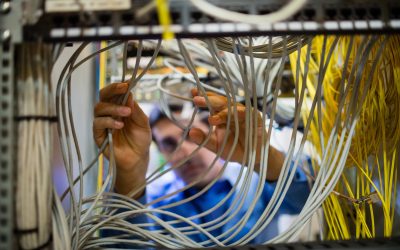70/20/10 learning and development works for you

The 70/20/10 learning and development model
The 70/20/10 learning and development model, developed in the early 90s by Robert Eichinger, Michael Lombardo and Morgan McCall, asserts that 70 percent of learning and development takes place from real-life and on-the-job experiences, tasks, and problem solving; 20 percent of the time, development comes from other people through informal or formal feedback, mentoring, or coaching; while 10 percent of learning and development comes from formal training.
The concern with this model is that formal learning initiatives are devalued and that if 90 percent of learning is informal, it therefore requires no attention. However, the 70/20/10 idea resulted from an effort to raise the awareness about informal learning and experiential learning that occurs usually without a mental acknowledgement or even planning by the learner, unlike when engaging in formalized learning which is more of a conscious decision.
70/20/10 should be an influence on training strategy rather than a strategy in itself.
The most useful application of this powerful model for understanding learners and their learning world should be to:
- Strongly support the 70% learning
- Develop and exploit the power of the 20%
- Design the 10% within the clear context of the other 90%
What Cabling Science Institute thinks about 70/20/10?
Professionals and leadership can get hung up on the numbers or the right combination. But what 70/20/10 is all about is recognizing that a lot of learning happens informally on the job and therefore is a culture change tool to support a model which strikes the right balance for the organization.
70/20/10 is about creating a culture of recognizing informal learning as well as promoting opportunities to learn informally. Issues around people not realizing they are learning as they are doing, but rather they need to attend a training session in a classroom is a significant challenge. Leaders, managers and staff need to shift their thinking about what, where, and how learning takes place. Not only does culture and mindset need to change, systems, policies and procedures are affected.
Some people may doubt this approach or whether it even works. However, we believe it is a philosophy not a formula.
- Some feel releasing control from formalized learning to informal may produce issues for the business
- Quality can’t be assured or controlled
- The knowledge and skill transfer may be incorrect
- The trainer/coach/mentor may not have the right skills
In reality it is not too different to apprentice type schemes proven in industry, and with the right support from students’ managers and supervisors is a powerful way to engage and encourage employees.
The Cabling Science Institute helps facilitate this philosophy by moving formal training material to an online delivery. It enables the ‘10%’ of formal training to be consistently delivered, when, where and at the pace of the student, and it remains available for further review as they learn on the job and with the support of experienced coaches or mentors.

Written by James Donovan
You might also enjoy
FO Connector Contamination – A Constant Threat
Fiber optic communication most commonly works in duplex or multifiber transmission by transmitting light to a receiver in one direction on a fiber and receiving transmitted light back to a second receiver on the second fiber. Most engineers can understand that and...
Why Inspect and Clean Fiber Optic Connectors?
Inspecting and cleaning of fiber optic connectors during installation and when making any patching, is essential. Any contamination on a patch cord connector will be transferred through the coupler to the connector it is mated to. Even when testing fibers with a test...
Cleaning MPOs
MPO connectors should always be inspected with a scope before they are used, be that on a patch cord or a bulkhead. If they need to be cleaned, one-click cleaners are keyed to ensure the tip only fits one way onto the connectors and is able to clean both male and...


